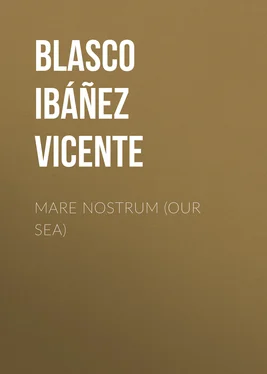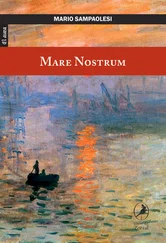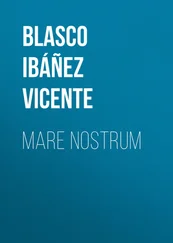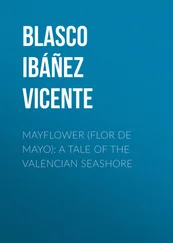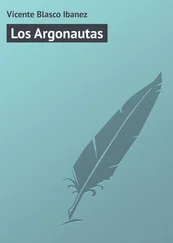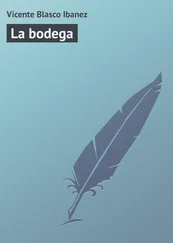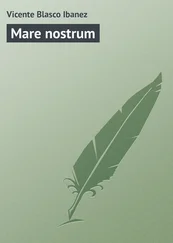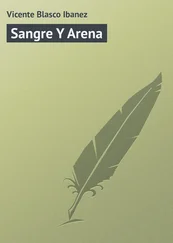Vicente Blasco Ibáñez - Mare Nostrum (Our Sea)
Здесь есть возможность читать онлайн «Vicente Blasco Ibáñez - Mare Nostrum (Our Sea)» — ознакомительный отрывок электронной книги совершенно бесплатно, а после прочтения отрывка купить полную версию. В некоторых случаях можно слушать аудио, скачать через торрент в формате fb2 и присутствует краткое содержание. Жанр: foreign_prose, foreign_antique, на английском языке. Описание произведения, (предисловие) а так же отзывы посетителей доступны на портале библиотеки ЛибКат.
- Название:Mare Nostrum (Our Sea)
- Автор:
- Жанр:
- Год:неизвестен
- ISBN:нет данных
- Рейтинг книги:5 / 5. Голосов: 1
-
Избранное:Добавить в избранное
- Отзывы:
-
Ваша оценка:
- 100
- 1
- 2
- 3
- 4
- 5
Mare Nostrum (Our Sea): краткое содержание, описание и аннотация
Предлагаем к чтению аннотацию, описание, краткое содержание или предисловие (зависит от того, что написал сам автор книги «Mare Nostrum (Our Sea)»). Если вы не нашли необходимую информацию о книге — напишите в комментариях, мы постараемся отыскать её.
Mare Nostrum (Our Sea) — читать онлайн ознакомительный отрывок
Ниже представлен текст книги, разбитый по страницам. Система сохранения места последней прочитанной страницы, позволяет с удобством читать онлайн бесплатно книгу «Mare Nostrum (Our Sea)», без необходимости каждый раз заново искать на чём Вы остановились. Поставьте закладку, и сможете в любой момент перейти на страницу, на которой закончили чтение.
Интервал:
Закладка:
Piracy and smuggling had formed the historic past of all the villages that Ulysses was visiting, some huddled in the shelter of the promontory crowned with a lighthouse, others opening on the concavity of a bay dotted with barren islands girdled with foam. The old churches had turrets on their walls and loopholes in their doors for shooting with culverins and blunderbusses. The entire neighborhood used to take refuge in them when the smoke columns from their watchmen would warn them of the landing of pirates from Algiers. Following the curvings of the promontory there was a dotted line of reddish towers, each one accompanied by a smaller pair for lookouts. This line extended along the south toward the Straits of Gibraltar, and on its northern side reached to France.
The doctor had seen their counterpart in all the islands of the western Mediterranean, on the coasts of Naples and in Sicily. They were the fortifications of a thousand-year war, of a struggle ten centuries long between Moors and Christians for the domination of the blue sea, a struggle of piracy in which the Mediterranean men—differentiated by religion, but identical at heart—had prolonged the adventures of the Odyssey down to the beginnings of the nineteenth century.
Ferragut gradually became acquainted with many old men of the village who in their youth had been slaves in Algiers. On winter evenings the oldest of them were still singing romances of captivity and speaking with terror of the Berber brigantines. These thieves of the sea must have had a pact with the devil, who notified them of opportune occasions. If in a convent some beautiful novices had just made their profession, the doors would give away at midnight under the hatchet-blows of the bearded demons who were advancing inland from the galleys prepared to receive their cargo of feminine freight. If a girl of the coast, celebrated for her beauty, was going to be married, the infidels, lying in wait, would surround the door of the church, shooting their blunderbusses and knifing the unarmed men as they came out, in order to carry away the women in their festal robes.
On all the coast, the pirates stood in awe only of the navigators from the Marina , so fearless and warlike were they. If their villages were ever attacked, it was because their seafaring defenders were on the Mediterranean and, in their turn, had gone to sack and burn some village on the coast of Africa.
The Triton and his nephew used to eat their supper under the arbor in the long summer twilights. After the cloth was removed Ulysses would manipulate his grandfather's little frigates, learning the technical parts and names of the different apparatus, and the management of the sets of sails. Sometimes the two would stay out on the rustic porch until a late hour gazing out over the luminous sea sparkling under the splendor of the moon, or streaked with a slender wake of starry light in the murky nights.
All that mankind had ever written or dreamed about the Mediterranean, the doctor had in his library and could repeat to his eager little listener. In Ferragut's estimation the mare nostrum ["Mare Nostrum" (Our Sea), the classic name for the Mediterranean.] was a species of blue beast, powerful and of great intelligence—a sacred animal like the dragons and serpents that certain religions adored, believing them to be the source of life. The rivers that threw themselves impetuously into its bosom in order to renew it were few and scanty. The Rhone and the Nile appeared to be pitiful little rivulets compared with the river courses of other continents that empty into the oceans.
Losing by evaporation three times more liquid than the rivers bring to it, this sunburnt sea would soon have been converted into a great salt desert were not the Atlantic sending it a rapid current of renewal that was precipitated through the Straits of Gibraltar. Under this superficial current existed still another, flowing in an opposite direction, that returned a part of the Mediterranean to the ocean, because the Mediterranean waters were more salt and dense than those of the Atlantic. The tide scarcely made itself felt on its strands. Its basin was mined by subterranean fires that were always seeking extraordinary outlets through Vesuvius and Aetna and breathed continually through the mouth of Stromboli. Sometimes these Plutonic ebullitions would come to the surface, making new islands rise up upon the waters like tumors of lava.
In its bosom exist still double the quantity of animal species that abound in other seas, although less numerous. The tunny fish, playful lambs of the blue pasture lands, were gamboling over its surface or passing in schools under the furrows of the waves. Men were setting netted traps for them along the coasts of Spain and France, in Sardinia, the Straits of Messina and the waters of the Adriatic. But this wholesale slaughter scarcely lessened the compact, fishy squadrons. After wandering through the windings of the Grecian Archipelago, they passed the Dardanelles and the Bosphorus, stirring the two narrow passageways with the violence of their invisible gallopade and making a turn at the bowl of the Black Sea, swimming back, decimated but impetuous, to the depths of the Mediterranean.
Red coral was forming immovable groves on the substrata of the Balearic Islands, and on the coasts of Naples and Africa. Ambergris was constantly being found on the steep shores of Sicily. Sponges were growing in the tranquil waters in the shadow of the great rocks of Mallorca and the Isles of Greece. Naked men without any equipment whatever, holding their breath, were still descending to the bottom as in primitive times, in order to snatch these treasures away.
The doctor gave up his geographic descriptions to discourse on the history of his sea, which had indeed been the history of civilization, and was more fascinating to him. At first miserable and scanty tribes had wandered along its coasts seeking their food from the crustaceans drawn from the waves—a life similar to that of the rudimentary people that Ferragut had seen in the islands of the Pacific. When stone saws had hollowed out the trunks of trees and human arms had ventured to spread the first rawhides to the forces of the atmosphere, the coasts became rapidly populated.
Temples were constructed on the promontories, and maritime cities—the first nuclei of modern civilization—came into existence. On this landlocked sea mankind had learned the art of navigation. Every one looked at the waves before looking at the sky. Over this blue highway had arrived the miracles of life, and out of its depths the gods were born. The Phoenicians—Jews, become navigators—abandoned their cities in the depths of the Mediterranean sack, in order to spread the mysterious knowledge of Egypt and the Asiatic monarchies all along the shores of the interior sea. Afterwards the Greeks of the maritime republics took their places.
In Ferragut's estimation the greatest honor to which Athens could lay claim was that she had been a democracy of sailors, her freemen serving their country as rowers and all her famous men as great marine officials.
"Themistocles and Pericles," he added, "were admirals of fleets, and after commanding ships, governed their country."
On that account Grecian civilization had spread itself everywhere and had become immortal instead of lessening and disappearing without fruit as in the interior lands. Then Rome, terrestrial Rome, in order to hold its own against the superiority of the Semitic navigators of Carthage, had to teach the management of the oar and marine combat to the inhabitants of Latium, to their legionaries with faces hardened by the chin straps of their helmets, who did not know how to adjust their world-dominating iron-shod feet to the slippery planks of a vessel.
The divinities of mare nostrum always inspired a most loving devotion in the doctor. He knew that they had not existed, but he, nevertheless, believed in them as poetic phantasms of natural forces.
Читать дальшеИнтервал:
Закладка:
Похожие книги на «Mare Nostrum (Our Sea)»
Представляем Вашему вниманию похожие книги на «Mare Nostrum (Our Sea)» списком для выбора. Мы отобрали схожую по названию и смыслу литературу в надежде предоставить читателям больше вариантов отыскать новые, интересные, ещё непрочитанные произведения.
Обсуждение, отзывы о книге «Mare Nostrum (Our Sea)» и просто собственные мнения читателей. Оставьте ваши комментарии, напишите, что Вы думаете о произведении, его смысле или главных героях. Укажите что конкретно понравилось, а что нет, и почему Вы так считаете.
